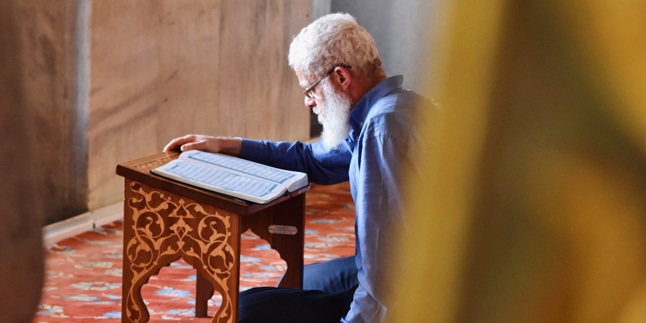Understanding the Meaning of Idgham in Tajweed, Also Know its Types
As we know, there are several rules of recitation that need to be understood in reciting the Quran. Idgham is one of them. So, what is the meaning of idgham?

Kapanlagi.com - The meaning of aqidah is important for Muslims. This is because aqidah can also be interpreted as faith. A person's understanding of aqidah is the basis or foundation for practicing the teachings of Islam.
Based on the explanation from the Big Indonesian Dictionary (KBBI), the meaning of aqidah or what has been absorbed into akidah is the basic belief or fundamental conviction. According to Islamic teachings, a person's understanding of aqidah must be sourced from the Quran and hadith.
This means that you cannot just understand the meaning of aqidah casually. Clear materials are needed to help you learn. Here is information about the types of aqidah, how to maintain it, and its goals that you can understand.

Illustration (Credit: Unsplash)
As mentioned earlier, the word aqidah has been absorbed into Indonesian language as 'akidah' which means basic belief or fundamental conviction.
Actually, this term comes from the Arabic language al-'aqdu which means bond, at-tautsiiqu which means belief, al-ihkaamu which means strengthening, and ar-rabthu biquw-wah which means binding strongly. It can be concluded that the meaning of aqidah is a firm and certain faith, which leaves no doubt for those who believe in it.
Meanwhile, Islamic aqidah itself can be understood as a firm and certain belief in Allah with all the implementation of obligations. These obligations include believing in His oneness and obeying Him, believing in His angels, His messengers, His books, the Day of Judgment, and the predestination of good and evil.
In addition, Muslims also believe in everything that is authentic about the principles of religion (Ushuluddin), matters of the unseen, and believe in what is agreed upon (consensus) by the salafush shalih. Not only that, all qath'i (certain) news, both scientifically and practically, which have been established according to the Al-Qur'an and As-Sunnah which are authentic and the consensus of the salaf as-shalih must also be believed by Muslims.

Illustration (Credit: Unsplash)
To understand more deeply about the meaning of aqidah, you also need to listen to the explanation about the types of aqidah below.
1. Akidah Uluhiyah
The meaning of aqidah Uluhiyah can be understood as the belief in all kinds of worship that are only done for Allah SWT. This reflects the first pillar of faith, namely faith in Allah SWT. There is an explanation about this that you can read in Surah Al-Anbiyaa verse 92 which means:
"Indeed, this (monotheistic) religion is for all of you; the one religion and I am your Lord, so worship Me (alone)" (QS al-Anbiyaa:92).
2. Akidah Ruhanniyah
Furthermore, there is aqidah Ruhanniyah which means the belief in the only creator in this world is Allah SWT. Muslims must believe that the entire universe, angels, jinn, devils, demons, and spirits are creations of Allah, and are obedient and submissive to Him.
3. Akidah Nubuwwah
Aqidah Nubuwwah is a belief related to prophets and messengers, including books, miracles, and karamahs revealed to them. Well, this aqidah describes the third and fourth pillars of faith, namely faith in the Book and Messenger of Allah. You can see Allah's word in Surah Al-Baqarah verse 285 which means:
"The Messenger (Muhammad) believes in what has been sent down to him (the Qur'an) from his Lord, and (so do) the believers. All of them believe in Allah, His angels, His books, and His messengers. (They say), "We make no distinction between any of His messengers." And they say, "We hear and we obey. (Grant us) Your forgiveness, our Lord, and to You is the (final) destination." (QS. Al-Baqarah verse 285)
4. Akidah Sam'iyyah
Furthermore, there is aqidah sam'iyyah which is a belief about everything that can only be known through the evidence of the Qur'an and Assunah. This refers to the barzakh world, the hereafter, grave punishment, the day of judgment, heaven, and hell. This aqidah is a manifestation of the fifth and sixth pillars of faith, namely faith in the last day and faith in Qada and Qadar.
You can see this explanation in Surah Al-Araf verse 187 which means:
"They ask you (O Muhammad) about the Hour, "When is its arrival?" Say, "Its knowledge is only with my Lord. None will reveal its time except Him. It lays heavily upon the heavens and the earth. It will not come upon you except unexpectedly." They ask you as if you are familiar with it. Say, "Its knowledge is only with Allah, but most of the people do not know." (QS. Al-Araf:187)

Illustration (Credit: Unsplash)
In addition to understanding the meaning of aqidah and its various types, you also need to make an effort to maintain it. Here is an explanation of how to maintain aqidah that you can follow.
1. Adding or deepening knowledge. The knowledge referred to here is the knowledge of Tawheed (aqidah) as a whole. If you have mastered the correct Islamic aqidah, it will make you an honest, disciplined, and polite person. This explanation is stated in the Quran in Surah Fathir verse 28 which means:
"... Indeed, those who fear Allah among His servants are none but the knowledgeable ones. Indeed, Allah is Exalted in Might and Forgiving."
2. Always seeking Allah's pleasure
If you want to achieve Allah's pleasure in life, then do all activities that are in accordance with the corridors set by Allah, as explained and exemplified by the Prophet Muhammad. Including guidance contained in the holy book of the Quran. As commanded in Surah Al-Maidah verse 16 which means:
"With it Allah guides those who pursue His pleasure to the ways of peace and brings them out from darkness into the light, by His leave, and guides them to a straight path."
3. Surrendering to Allah
Explanation of this can be found in the Quran in Surah Al-Baqarah verse 112 which means:
"No! Whoever submits his face to Allah while he is a doer of good - then his reward is with his Lord. And no fear will there be concerning them, nor will they grieve."
4. Getting used to doing good deeds
After obtaining knowledge, the aqidah that has been mastered must be manifested in the form of real actions in daily life. These actions are commonly referred to as good deeds, both in the form of mahdhah worship and non-mahdhah worship. This command can be found in the Quran in Surah An-Nur verse 55 which means:
"Allah has promised those who have believed among you and done righteous deeds that He will surely grant them succession [to authority] upon the earth just as He granted it to those before them and that He will surely establish for them [therein] their religion which He has preferred for them and that He will surely substitute for them, after their fear, security, [for] they worship Me, not associating anything with Me. But whoever disbelieves after that - then those are the defiantly disobedient."
5. Getting used to jihad
Explanation of this can be found in the Quran in Surah As-Saff verses 10-11 which means:
"O you who have believed, shall I guide you to a transaction that will save you from a painful punishment?" (10)
"[It is that] you believe in Allah and His Messenger and strive in the cause of Allah with your wealth and your lives. That is best for you, if you should know." (11)
6. Getting used to remembrance (zikir) and reading and listening to the Quran
Remembrance (zikir) covers all the potential of the human heart, so it is called tongue remembrance, heart remembrance, brain remembrance, and body part remembrance. Therefore, remembrance can also develop the potential of the human heart. This is stated in the Quran in Surah Al-Anfal verse 2 which means:
"Indeed, those who believe are those whose hearts tremble at the mention of Allah. And when His verses are recited to them, it increases them in faith; and upon their Lord they rely."
7. Enlivening the mosque
Muslims are encouraged to enliven the mosque because it is the first institution for nurturing noble morals in the time of the Prophet Muhammad. That is, in addition to worship, the mosque can also be used as a place for education.
Well, KLovers, that is an explanation of the meaning of aqidah, various types of aqidah, and how to maintain and achieve it.
(kpl/ans)
Cobain For You Page (FYP) Yang kamu suka ada di sini,
lihat isinya
As we know, there are several rules of recitation that need to be understood in reciting the Quran. Idgham is one of them. So, what is the meaning of idgham?
For those who are used to using clear phone cases, seeing them dirty can be quite annoying. Therefore, it is reasonable if you are now looking for ways to clean clear phone cases to make them shine again.
For horror movie lovers, are you curious about what horror films will be released this year? Here are 8 of the most anticipated horror films in 2020.
The horror anime genre has a thrilling and terrifying storyline. Moreover, there are many best and most thrilling horror anime recommendations that must be watched. Check it out here, KLovers.
The name Shaquille is a popular and modern name for baby boys. Moreover, the name Shaquille also has a very beautiful meaning. Check it out here, KLovers.
Here are ways to hack WhatsApp that you can do precisely. There are ways to hack WhatsApp using additional applications or even without applications. Let's check it out.
Reported from various sources, here is the meaning of import along with the benefits and prohibited items that KLovers can know and learn.
KIP is distributed to students who are listed as less capable through the school. However, for students who are not registered, they can still make KIP to be able to get the card. How to do it?
As one of the citizens of Indonesia, it is important for you to understand the meaning of pluralism. Here is information that summarizes the material on the various types of pluralism, along with their positive and negative impacts.
Among the many surahs, Al Baqarah has the most number of verses. That's why it's important to know the meaning of Surah Al Baqarah.
Every Android phone can be installed with more than one Gmail account. But what if you want to delete one Gmail account on Android? Check out the guide here KLovers.
Looking for recommendations for school comedy anime? If so, just check out the following list and review.